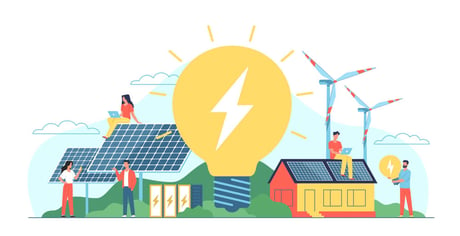
As energy companies charge into 2024, they will look to grow their business by eliminating manual processes with advanced ERP solutions. Renewable energy has also resurged through the transformation of the U.S. energy system with The Inflation Reduction Act (IRA) and Bipartisan Infrastructure Law (BIL) "encouraging investment in American energy supply chains, clean energy job creation, emissions reduction, and consumer energy savings" (energy.gov). These changes may ultimately require companies to expand infrastructure and alternative energy conversion structures or plants. As a result, energy companies must prioritize their decision-making capabilities to ensure speed and a competitive edge, as well as prepare for more capital-intensive projects within their ever-evolving industry. But what are some of the biggest challenges being faced by energy companies? And how will ERP technology change their landscape in 2024? In this special mini-series, Shawn Windle showcases the exciting future for energy companies thanks to advancements in ERP and the trends that will shape the market in the new year.
ERP Trends for Energy Companies
INTRODUCTION
Energy companies looking to grow in 2024 will start by eliminating manual processes with a new ERP, leveraging current economic trends to invest in systems. As a result of these trends, energy companies will need to make major decisions early in 2024 and weigh the benefits of an ERP upgrade alongside other capital-intensive projects. But what are some of the biggest pain points faced by energy companies? And how will ERP technology change the landscape in 2024? ERP Advisors Group answers these questions and more in this special industry review.
MAJOR ENERGY PAIN POINTS
Two major pain points caused the greatest concern for energy companies in 2023. First, energy companies faced staggering interest rates from buying heavy machinery, trucks, and other valuable assets. The loans they took out to acquire these essential assets or build infrastructure prevented many companies from making further investments in ERP to transform internal processes. Fortunately, energy companies provide products and services with an inelastic demand, so these investments would only increase their ability to deliver and reach greater ROI if done properly. The second pain point stems from compounding macroeconomic trends. Since the entire world runs on energy, energy companies have the most diversified customer portfolio out of all the industries. However, government policies and the economic climate can easily sway due to major political milestones, such as an election, so energy companies must prioritize their timeline and identify if they actually need a new ERP in 2024.
HOW THE ENERGY INDUSTRY WAS IMPACTED IN 2023
Recent government policies have helped energy companies justify a capital expenditure, like ERP when they previously couldn’t have. The government created policies to encourage sustainability and environmental responsibility. For example, renewable energy has resurged through the transformation of the U.S. energy system with The Inflation Reduction Act (IRA) and Bipartisan Infrastructure Law (BIL) "encouraging investment in American energy supply chains, clean energy job creation, emissions reduction, and consumer energy savings" (energy.gov).
Additionally, energy companies should prioritize making the move to a new ERP early in the year to avoid the negative impacts of political uncertainty and changes following the 2024 election. Major political changes can mean policy resets, which would negatively impact energy companies that relied on government funding for an ERP software upgrade. Alternatively, a new administration could shift the focus away from renewable energy initiatives to oil and gas, which would impact the way energy companies do business and their infrastructure focuses. Regardless, these companies need to consider all the pros and cons of upgrading versus staying on their current system in the first half of the year so they can plan accordingly before election turbulence.
WHAT ERP TOOLS SHOULD ENERGY COMPANIES LEVERAGE IN 2024?
Energy companies will shift their focus towards futureproofing their ERP systems in 2024 by leveraging emerging tools and updating the business. Energy is a dynamic and volatile industry, so their ERP strategies have to reflect their adaptive nature. This is where needs play a major role in ensuring energy companies do not attempt an upgrade unless it is absolutely necessary.
Amazingly, energy companies will be a part of emerging solutions in the coming years. As these companies revolutionize their operations to produce money-saving solutions, the ERP system vendors will capitalize on those savings for even greater efficiency and technological enhancement.
CONCLUSION
Energy companies will be able to grow in 2024 if they properly prepare and analyze their path forward. As they eliminate manual tasks and invest in advanced ERP technology, energy companies will be able to get more value by leveraging government policies and trends where necessary. We are excited to see how energy companies leverage emerging ERP technology to benefit their customers in 2024 and beyond.

.png)



